Religious Freedom
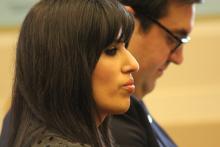
Religious freedom activists scolded the U.S. State Department for not appearing at a hearing Friday on Iran’s treatment of religious minorities, and called for greater government action to secure the release of people imprisoned there for their faith.
“The State Department is AWOL — they are absent without leave,” complained Jay Sekulow, chief counsel of the American Center for Law and Justice, a conservative law firm that represents the wife of Saeed Abedini, an Iranian-American minister in Tehran’s Evin prison. “They act as if they are embarrassed about Mr. Abedini’s faith.”

The Obama administration on Friday sought to placate religious groups by broadening religious exemptions and giving faith-based organizations more room to maneuver around its controversial contraception mandate, but the new rules offer no loopholes for privately owned businesses.
The contraception mandate, part of Obama’s health care overhaul, had set off an explosive church-state dispute and soured relations between the White House and some Christian groups, including the Catholic bishops’ conference.
The new rules, issued by the Health and Human Services Department, seek to address religious freedom concerns in two ways: First, they broaden the definition of “religious employers” so that all houses of worship and dioceses and affiliated organizations will be clearly exempt. Second, for other faith-based employers, the rules would transfer the costs and administrative tasks of the birth control insurance policies to insurance companies.
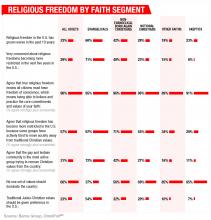
WASHINGTON — Half of Americans worry that religious freedom in the U.S. is at risk, and many say activist groups — particularly gays and lesbians — are trying to remove “traditional Christian values” from the public square.
The findings of a poll published Wednesday reveal a “double standard” among a significant portion of evangelicals on the question of religious liberty, said David Kinnaman, president of Barna Group, a California think tank that studies American religion and culture.
While these Christians are particularly concerned that religious freedoms are being eroded in this country, “they also want Judeo-Christians to dominate the culture,” said Kinnamon.
“They cannot have it both ways,” he said. “This does not mean putting Judeo-Christian values aside, but it will require a renegotiation of those values in the public square as America increasingly becomes a multi-faith nation.”
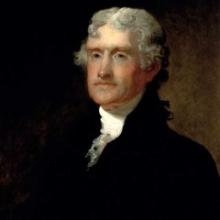
Today is Religious Freedom Day — a day to celebrate the adoption of Thomas Jefferson’s Virginia Statute for Establishing Religious Freedom. Why celebrate it?
Celebrate because our government does not use our tax dollars to propagate religion, something Jefferson found “sinful and tyrannical.” This does not mean that you have a right to stop any government action that you happen to think violates your religious beliefs — a ridiculous claim repeated during last year’s battle over insurance coverage for contraceptives.
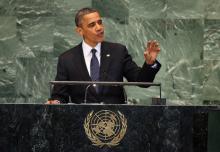
President Obama on Tuesday gave a forceful speech at the United Nations, in which he challenged much of the world's assumptions about free speech and religion.
Here are five points from his address, which together, add up to as close to an Obama Doctrine on Religion as we've seen:
1. Blasphemy must be tolerated, however intolerable
The idea that the U.S. protects even vile speech, so ingrained in American culture, seems counterintuitive to much of the world. It’s an especially tough concept when speech targets a religion, but Obama argued that restrictions on speech too often become weapons to suppress religion – especially the rights of religious minorities.

Jacques Berlinerblau wastes no ink in his new book trying to flatter his fellow nonbelievers.
"American atheist movements, though fancying themselves a lion, are more like the gimpy little zebra crossing the river full of crocs," he writes in How to Be Secular: A Call to Arms for Religious Freedom.
Ouch.
"In terms of both political gains and popular appeal, nonbelievers in the United States have little to show. They are encircled by cunning, swarming [religious] Revivalist adversaries who know how to play the atheist card."
Berlinerblau, a Georgetown University biblical scholar who teaches a course on secularism, wants to rescue that little zebra. But his plan may be a hard-sell with some atheists — he wants atheist groups to drop their black-and-white opposition to religion and its adherents in order to preserve the Constitution's guarantee of freedom of religion.
"The gimpy zebra remark was a little goofing on this over-the-top chest-thumping that emerges from Movement Atheists," he said in an interview, referring to atheist organizations with political goals, like American Atheists. "They wildly overestimate their numbers. They tend to overestimate the efficacy of their activism. They underestimate how disciplined and organized their adversaries in the religious right are, too."

According to a report late Friday from Christian Solidarity Worldwide, an international organization devoted to issues of religious freedom, Pastor Youcef Nadarkhani, a Muslim convert to Christianity who has been imprisoned by the Iranian government since 2009 on apostasy charges, has been acquitted and released from prison.
Nadarkhani, 35, previously had faced a possible death sentence for the charges against him, a result of his prostelytizing Muslims to convert to Christianity. He also refused to deny his Christian faith to save himself from execution.
Since his detainment three years ago, the U.S. State Department, the British government, the Vatican, Amnesty International, and a host of Christian organizations and leaders — including South Africa's Archbishop Desmond Tutu — have called on the Iranian government to release the young pastor.
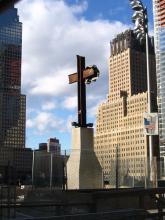
A lawsuit that was filed by the group American Atheists to keep a revered cross out of the National September 11 Museum is being challenged by a conservative law firm that defends the public display of religious symbols.
The American Center for Law and Justice filed a friend-of-the-court brief on Monday on behalf of the suit’s two defendants, the National September 11 Memorial & Museum Foundation and the Port Authority of New York and New Jersey, which owns the site.
“The legal arguments of the atheist organization are both offensive and absurd,” the center’s chief counsel, Jay Sekulow, said in a statement. He said 190,000 people had signed a petition opposing the lawsuit.

Voters in Missouri overwhelmingly approved a "right to pray" amendment to the state's constitution on Tuesday, despite concerns about the measure's necessity and legality.
Amendment 2, which supporters said would protect the freedom of religious expression in public schools and other public spaces, received nearly 80 percent of the vote.
The language on Tuesday's ballot stressed the rights of citizens to express their religious beliefs and the rights of children to pray and acknowledge God in schools. It also stated that students could be exempted from classroom activities that violate their religious beliefs.
State Rep. Mike McGhee, a Republican who sponsored the amendment, said it would remind people about their religious freedoms, such as reading religious books at school. "It's OK to bring your Bible to study hall," he said.
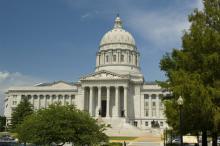
Missourians will vote on Tuesday on a proposed amendment to the state constitution that supporters say would protect residents' right to pray in public. If a recent poll is any indication, it could pass by a mammoth margin.
Supporters say the so-called "right to pray" ballot measure — known as Amendment 2 — better defines Missourians' First Amendment rights and will help to protect the state's Christians, about 80 percent of the population, who they say are under siege in the public square.
Opponents, meanwhile, say that the religious protections Amendment 2 would offer are already guaranteed by the Bill of Rights and the U.S. Constitution, and that it will open the door to all manner of unintended and costly consequences including endless taxpayer-funded lawsuits.
A new poll shows that American Catholics tend to agree with their bishops’ concerns that religious liberties are at risk in the U.S.
Nevertheless, Catholics seem to be warming to President Obama, even as the bishops lambaste his administration in their fight to roll back a federal mandate that requires employers — with some exceptions — to cover birth control in their health plans.
The poll, released on Aug. 1 by the Pew Forum on Religion & Public Life as the contraception mandate took effect, found that among Catholics who are aware of the bishops' protests, 56 percent say they agree with the bishops’ concerns, as opposed to 36 percent who disagree.

Today Wheaton College, a leading evangelical Christian school and the alma mater of the Rev. Billy Graham in Illinois, sought an injunction for "emergency relief," as it seeks to remain exempt from the Health and Human Services (HHS) insurance mandate which comes into effect today.
Filed on Wheaton's behalf by The Becket Fund for Religious Liberty, the preliminary injunction would, the college hopes, temporarily keep at bay the fines which would be levied on them under the mandate, should they fail to comply with the provisions.
The provisions, which are part of the Affordable Care Act, would require “most employer health insurance plans to provide birthday control coverage,” as was reported on God’s Politics last month. Many Catholic institutions and groups have already filed lawsuits again the mandate, and Wheaton is one of a growing number of evangelical institutions joining in the legal challenge.
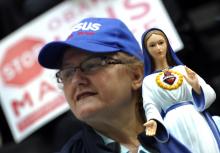
The Obama administration’s policy requiring most employers to provide free birth control coverage in their health insurance policies takes effect on Aug. 1 — a deadline that has sparked apocalyptic warnings from conservative activists and some faith groups.
“August 1st is a day that will live in infamy for the First Amendment and the fundamental freedoms and rights we as a people have enjoyed since the founding of our nation,” said Brent Bozell, head of ForAmerica. “With the stroke of a pen, the Obama Administration has shredded the First Amendment and the Constitution right before our eyes.”
“August 1st will be remembered as the day our most cherished liberty was thrown in a government dumpster and hauled away,” echoed Matt Smith, head of Catholic Advocate. And that’s just a sampling of the outrage.
Are the claims legitimate? As with most federal regulations, it’s complicated, and the supercharged politics of the issue, in the midst of a presidential campaign, don’t help.
Moreover, religious freedom is by its nature a topic that prompts heated debates — without always providing a clear answer.
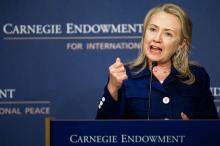
Religious minorities continue to suffer loss of their rights across the globe, the State Department reported on Monday, with a rise in blasphemy laws and restrictions on faith practices.
Almost half of the world's governments "either abuse religious minorities or did not intervene in cases of societal abuse," said Ambassador-at-Large Suzan Johnson Cook at a State Department briefing on the 2011 International Religious Freedom Report.
"It takes all of us — governments, faith communities, civil society working together to ensure that all people have the right to believe or not to believe," she said.
Christians in Egypt, Tibetan Buddhists in China and Baha'is in Iran are among those without religious rights, the report states.
In Pakistan, Saudi Arabia and Indonesia, people have been killed, imprisoned or detained because they violated or criticized blasphemy laws. In Indonesia, a Christian was sentenced to prison for five years for distributing books that were considered “offensive to Islam.”
These statutes, the U.S. government says, silence people in countries that claim to be “protecting religion.”
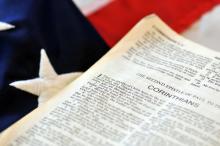
Right now, it’s difficult to voice a call for civility surrounding religious debates without backlash that you’re stomping on rights or stifling someone’s voice. But here’s hoping.
Religious freedom. What does it mean, and what were we promised? In Sunday’s New York Times, Ross Douthat — columnist and author of Bad Religion: How We Became a Nation of Heretics — points out that we have a guaranteed right not only to religious belief, but to religious exercise. That right to religious exercise, he argues, is violated in cases like the HHS mandate and the Chick-fil-A debacle.
From Douthat’s piece:
“If you want to fine Catholic hospitals for following Catholic teaching, or prevent Jewish parents from circumcising their sons, or ban Chick-fil-A in Boston, then don’t tell religious people that you respect our freedoms. Say what you really think: that the exercise of our religion threatens all that’s good and decent, and that you’re going to use the levers of power to bend us to your will.”
From here, people tend to go to extremes. On one side: boycott everything whose owner you have a philosophical or religious disagreement with on a personal level. But really do it. Sure it’s easy enough to shun fast food, but enough research will likely prove that our American dream to be comfortable far outweighs our attention span. (Please excuse my cynicism, and please let me know if any of you are successful in this endeavor. I’ll tip my hat to you.)
Of course, it cuts both ways. Extremism comes in a variety of political preferences, so I’ll throw this out there as well: No, there is not a “war on religion” in the United States.

MARINE, Ill. — Joseph Haegele remembers going to the church across the road from his grandparents' house on Windmill Street in this farm town in 1956, when he was 5 years old.
Haegele has attended other Catholic churches in the area. But St. Elizabeth's remains special to the former General Chemical employee and his wife, Lynn. The annual church picnic has been part of family tradition for decades. And after their 25-year-old son died of a brain tumor 15 years ago, Haegele said, the couple adopted a priest's flower garden behind St. Elizabeth's rectory as a memorial.
But a Madison County Circuit Judge Duane Bailey has ruled that Haegele can worship at St. Elizabeth's only on the last weekend of each month.
Legal experts say the judge's order illustrates the conflict between orders of protection and religious liberty. And prior cases have affirmed the rights of courts to issue restraining orders on individuals even if it affects their ability to attend a house of worship.
Bailey's order is extraordinary in that it imposes not only distances of separation, but specifically bars access to a church on particular days.
Louisiana State Rep. Valarie Hodges used to be a big fan of school vouchers.
“I liked the idea,” she explained, “of giving parents the option of sending their children to a public school or a Christian school.”
Hodges got a First Amendment reality check when she discovered that Christian schools wouldn’t be the only religious schools getting tax dollars.
“Unfortunately, it (vouchers) will not be limited to the Founders’ religion,” she said in June. “We need to ensure that it does not open the door to fund radical Islam schools. There are a thousand Muslim schools that have sprung up recently. I do not support using public funds for teaching Islam anywhere here in Louisiana.”
Although Gov. Bobby Jindal’s voucher plan passed last month without her support, Hodges vowed to keep looking for alternative ways to “support funding for teaching the fundamentals of America’s Founding Fathers’ religion, which is Christianity, in public schools or private schools.”
Beyond the fact that some of the Founders were not Christian, Hodges appears confused – to put it mildly – about the implications of the First Amendment’s guarantee of religious freedom for all, including American Muslims.
HARRISBURG, Pa. --- The director of the Pennsylvania chapter of American Atheists says he will desecrate the Quran if the state House of Representatives doesn't drop a "Year of Religious Diversity" resolution.
Ernest Perce, of Harrisburg, Pa., said he plans to flog the Quran in the state Capitol Rotunda on Sept. 24 should the House not agree to nullify the resolution before it reconvenes from summer recess that day.
Like the "Year of the Bible" resolution adopted in January, the "Year of Religious Diversity" resolution illegally intertwines religion and state, Perce said.
"The Year of the Bible" resolution is being challenged in federal court by the Freedom From Religion Foundation.

Seventh-day Adventists have filed a federal lawsuit challenging the constitutionality of two ordinances in an Alabama city that the church says bars it and other religious groups from door-to-door solicitations unless they first register and pay license fees.
The lawsuit was filed after a member of the church's Summer Student Missionary Program was ticketed in June by a police officer for selling books door-to-door without a City of Alabaster permit, the lawsuit states. After the citation, the group suspended its program in Alabaster, which is about 20 miles south of Birmingham.
"The City of Alabaster has enacted two sweeping ordinances that unconstitutionally restrict the exchange of beliefs and religious principles within the Alabaster city limits," the lawsuit states. The ordinances were enacted in 1994.
The lawsuit seeks a court order that declares the ordinances unconstitutional and bars the city from enforcing them.
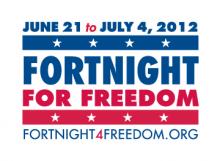
On June 21, Catholics across the country will amplify what is an already loud outcry from the hierarchy over the federal government's so-called contraception mandate.
With rallies, marches, lectures and special publications, the U.S. Catholic Bishop's Fortnight for Freedom campaign will seek to galvanize Catholic opposition to President Obama's proposed mandate to require employers — including religious institutions — to provide free contraception insurance coverage to employees.
But while Catholic leaders frame the events as a fight for religious liberty, critics see signs of political partisanship and electioneering. Questions over the financing of the bishops' campaign have caused those suspicions to multiply.
"The activities around the Fortnight for Freedom cost money," said Steve Schneck, director of the Institute for Policy Research & Catholic Studies at the Catholic University of America in Washington. "What groups are paying for this, and what's the accountability for that money?"